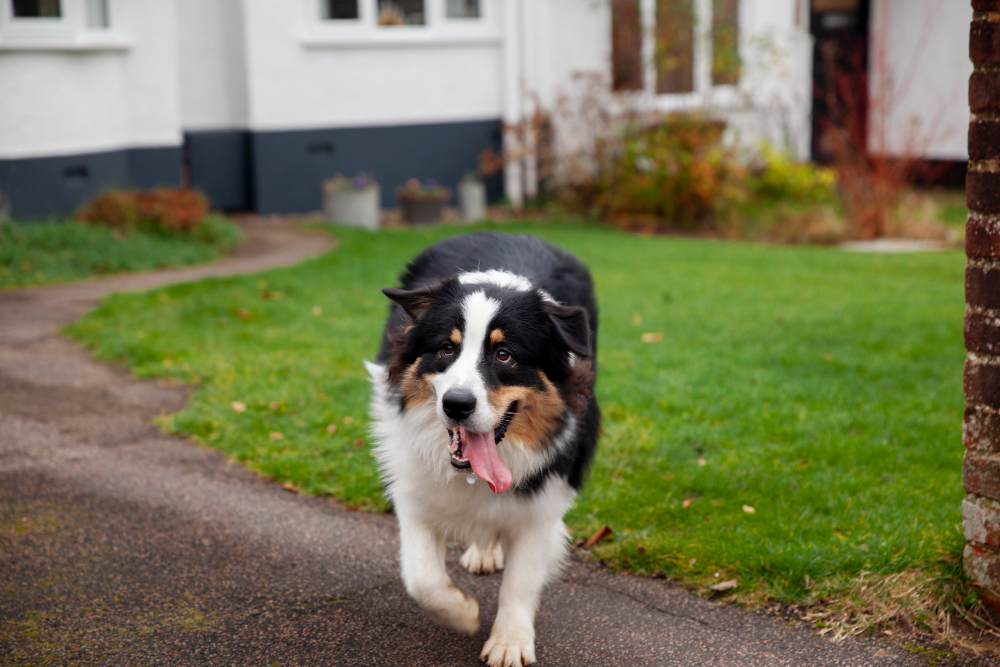How Often Do Dogs Need to Pee?

Updated November 14, 2025
Understanding your dog’s bathroom needs is crucial for their health, comfort, and your peace of mind as a pet parent. Whether you’re dealing with a new puppy, a healthy adult dog, or a beloved senior companion, knowing when and how often they need to relieve themselves helps you create a routine that works for everyone. This comprehensive guide is designed to help you understand your dog’s urination patterns and recognize when there may be a need for attention.
What You Can Expect: General Guidelines
Every dog is different, but here are some helpful guidelines for typical urination frequency:
Adult Dogs (6 months to 7 years)
Most healthy adult dogs need to urinate 3-5 times per day, or approximately every 6-8 hours. According to Daily Paws, a good rule of thumb is to let your dog out to urinate at least every six hours, although it’s best to let them relieve themselves more frequently when possible.
Puppies (under 6 months)
Young puppies need much more frequent bathroom breaks—typically every 2-4 hours, or about 6-8 times per day. The general rule for puppies is that they can hold their bladder for approximately one hour for every month of age.
Senior Dogs (over 7 years)
Older dogs typically require bathroom breaks every 4-6 hours, or approximately 4-6 times per day, as they may begin to experience some loss of bladder control with age.
Understanding the Puppy Stage
Puppies are in a league of their own when it comes to bathroom frequency. Their tiny bladders and developing digestive systems mean they simply can’t wait very long to pee.
The Monthly Rule for Puppies
For every month of age, that’s approximately an hour a puppy can control urination, but even that’s really stretching their limit. When your puppy is about 2 months old and you start potty training, you might be able to expand to every two hours, depending on their signals, eating and drinking patterns, and individual development.
Key Timing for Puppy Bathroom Breaks
Puppies are most likely to need the bathroom:
- Immediately after waking up
- Within 15 minutes of eating or drinking
- During and after playing
- When they seem restless or start sniffing around
Even at 4 months old, they can’t hold it for a whole day, so until your pup is about 6 months old, you may need to create a containment area with pee pads or choose a room with easy-to-clean flooring in case of any accidents.
Factors That Influence How Often Your Dog Needs to Pee
Understanding what affects your dog’s bathroom schedule helps you provide better care and recognize when something might be changing.
Size and Breed Considerations
Smaller dogs have smaller bladders and may need to pee more often than larger breeds. For example, Chihuahuas have much smaller bladders than Golden Retrievers, so you’ll need to take this into account when planning bathroom breaks. However, the dog’s breed typically shouldn’t make a significant difference in urination frequency unless that breed is predisposed to kidney issues.
Diet and Hydration
Your dog’s diet plays a crucial role in their bathroom habits. Dogs that consume wet food or drink more water will require more frequent bathroom breaks. A diet high in moisture or certain ingredients can cause more frequent urination, while dogs eating primarily dry kibble may need fewer breaks.
Activity Level
Active dogs that exercise or play frequently may require more potty breaks. Their increased water intake and higher metabolism from activity can lead to more frequent urination.
Health Status and Age
Various health conditions can affect bathroom frequency. Overweight dogs may need to pee more often, and certain medications can cause increased urination. As dogs age, their urination needs often change, requiring more frequent opportunities to relieve themselves.
Special Considerations for Senior Dogs
Just like humans, older dogs may struggle with bladder control as they age. Senior dogs typically require bathroom breaks every 4-6 hours, but this interval can vary depending on their breed, weight, and any existing health issues.
Common Senior Dog Challenges
Some older dogs become increasingly reluctant to get up and move, which can lead to decreased water intake and potential dehydration. It’s important to ensure they have easy access to water and are taken out regularly every few hours.
Spayed female dogs can sometimes develop urinary sphincter mechanism incontinence (USMI) as they age. This condition means they can’t hold urine as effectively as before, and small amounts may leak out, especially when lying down. According to Purina, many conditions, such as USMI, are treatable with medication, so it’s worth discussing with your veterinarian.
Maintaining Senior Dog Comfort
Make sure senior dogs have easy access to water where they rest and provide stable flooring to help them move around without obstacles. If arthritis is affecting mobility, consider discussing pain medication with your vet to help them get outside more comfortably.
Recognizing the Signs Your Dog Needs to Go
Learning to read your dog’s signals helps prevent accidents and ensures their overall well-being and comfort. Common signs that your dog needs to pee include:
- Whimpering, pacing, or restlessness
- Going to the door and staring at you
- Circling or sniffing around
- Squatting behavior without actually urinating
- Scratching at the door or whining
Dogs tend to urinate more frequently in the morning after waking up, after meals, following playtime, or during periods of excitement.
When Bathroom Habits Signal Health Concerns
Changes in your dog’s normal urination patterns can indicate underlying health issues that need attention. According to AKC, any change in urinary patterns should be reported to a veterinarian as soon as possible.
Warning Signs to Watch For
Contact your veterinarian if you notice:
- A sudden increase in urination frequency
- Straining or appearing painful when urinating
- Blood in the urine or unusual odor
- Frequent attempts to urinate with little or no result
- Accidents in previously house-trained dogs
- Excessive thirst accompanying increased urination
Common Health Conditions Affecting Urination
Several conditions can impact your dog’s bathroom habits:
- Urinary tract infections: More common in senior dogs and females
- Diabetes: Causes excessive thirst and increased urination
- Kidney disease: Can affect urine production patterns
- Bladder stones: May cause frequent, painful urination
- Cushing’s disease: Often causes increased drinking and urination in older dogs
Managing Your Dog’s Bathroom Schedule
Creating a consistent routine benefits both you and your dog by reducing accidents and ensuring their comfort.
Essential Daily Schedule
The two most universal times to take your dog out are first thing in the morning and right before bed. From there, they need to go out one or two more times at minimum, based on your schedule.
When You’re Away from Home
If you’ll be out all day and can’t get home to let your dog out, consider arranging for a friend, family member, pet sitter, or dog walker to provide regular bathroom breaks. According to PetSafe, consistently expecting a dog to hold their urine for much longer than 8 hours can lead to health issues, including urinary tract infections or bladder stones.
Indoor Solutions
For times when outdoor access isn’t possible, consider:
- Pee pads in a designated area
- Indoor grass systems
- Doggy doors for independent access to a secure yard
- Professional dog walking services
Creating a Healthy Routine
The key to managing your dog’s bathroom needs successfully is understanding their individual patterns and maintaining consistency.
Tips for Success
- Establish regular feeding times to predict bathroom needs
- Take your dog out at consistent times daily
- Reward successful outdoor elimination
- Monitor changes in frequency or behavior
- Ensure easy access to fresh water
- Consider your dog’s age-specific needs
Emergency Preparedness
Keep contact information for emergency veterinary clinics readily available, and don’t hesitate to call if you notice sudden changes in your dog’s urination patterns, especially if accompanied by other symptoms like lethargy, loss of appetite, or signs of pain.
How Can Pet Insurance Help You if Your Dog Needs Treatment?
Pet insurance can be a valuable tool in managing the costs of treating a dog’s veterinary expenses. By having a pet insurance policy in place, you can have peace of mind knowing that you can provide medical care for your furry companion without worrying about the financial burden. Pet insurance can help cover the costs of veterinary consultations, diagnostic tests, medications, and even specialized treatments if required.
Reimbursement
This method is the most common for pet insurance companies. You pay out of pocket for the veterinarian bill, and then the insurance company reimburses you for what’s covered under the insurance plan. The steps look like this.
- You pay the vet bill after your dog’s visit.
- You fill out the pet insurance claim form.
- Submit the claim form and other required documentation to the insurer.
- After the claim is approved, you will be reimbursed for eligible expenses.
What Does Odie Pet Insurance Cover?
Pet insurance covers various veterinary expenses, providing financial protection and peace of mind for pet owners. Here are the details of the coverage options offered by Odie Pet Insurance:
Illness & Injury Plan
The Illness & Injury Plan is an all-inclusive insurance plan designed to cover a wide range of medical needs for your pet. This plan includes comprehensive coverage for various illnesses, injuries, and veterinary services. Some of the covered items include:
- Veterinary exams and consultations
- Diagnostics (e.g., X-rays, lab tests)
- Prescribed medications
- Surgeries and hospitalization
- Rehabilitation, acupuncture, or chiropractic treatments
- Medically necessary supplies
- Euthanasia and cremation
The Wellness Plan
The Wellness Plan is a monthly membership that focuses on preventive care and covers routine veterinary services.
- Provides reimbursements for routine care items such as wellness visits (exams and vaccines), testing and parasite prevention, dental cleanings and at-home dental care, vitamins, supplements, and more.
- Through Odie’s partnership with Petivity, a leader in smart pet products and proactive care, Wellness Plan members can also receive reimbursements for Petivity devices and health kits, as well as eligible Purina food and supplements.
- Total reimbursement up to $700 per year.
FAQs
How often do dogs need to pee?
- Puppies (under 6 months): Every 2-4 hours, 6-8 times daily. Need breaks immediately after waking, after every meal/drink, during/after play, and hourly when awake.
- Adult dogs (6 months-7 years): Every 6-8 hours, 3-4 times daily. Can hold urine for 6-8 hours, but this is not recommended.
- Senior dogs (over 7 years): Every 4-6 hours, 4-6 times daily. Decreased bladder control requires more frequent breaks.
What factors affect how often my dog needs to pee?
- Size/breed: Smaller dogs have smaller bladders and need more frequent breaks; toy breeds are more prone to urinary issues.
- Activity level: Active dogs need more breaks due to increased water intake and metabolism.
- Diet: High-moisture or diuretic diets cause more frequent urination.
- Health conditions: Diabetes, kidney disease, UTIs, bladder stones, hormonal imbalances, neurological disorders, and prostate issues (males) all affect bathroom habits.
What are the signs my dog needs to pee or is holding it too long?
- Needs to pee: Frequent squatting/circling without urinating, whining/restlessness near doors, excessive licking of genital area, sniffing corners, pacing.
- Holding too long: Same signs plus discomfort/distress. Holding urine for extended periods causes UTIs, bladder problems, kidney issues, crystals/stones, and significant stress.
When should I be concerned about my dog’s urination habits?
You should contact your veterinarian when you notice sudden changes in frequency, straining/discomfort when urinating, blood in the urine, an unusual urine odor, accidents from a previously house-trained dog, an inability to urinate, or excessive urination paired with increased thirst. These may indicate UTIs, diabetes, kidney disease, bladder stones, hormonal imbalances, neurological disorders, or prostate issues.
What should I do if I’m away all day?
Dogs should never hold their bladder for too long—it can cause health issues and stress. Options: ask a friend/family to visit, hire a pet sitter/dog walker, or consider doggy daycare. Adult dogs shouldn’t go more than 6-8 hours without breaks. Most healthy adults can sleep through the night (6-8 hours), but puppies, seniors, and dogs with health conditions may need nighttime breaks.
How can I establish a healthy bathroom routine?
Take the dog out at consistent times daily. Provide breaks first thing in the morning and right before bed. Offer additional breaks based on age/needs. Monitor water intake and pay attention to individual signals/patterns. Never punish accidents—this may indicate health issues or a need for schedule adjustment. Track everyday habits to quickly identify concerning changes.




